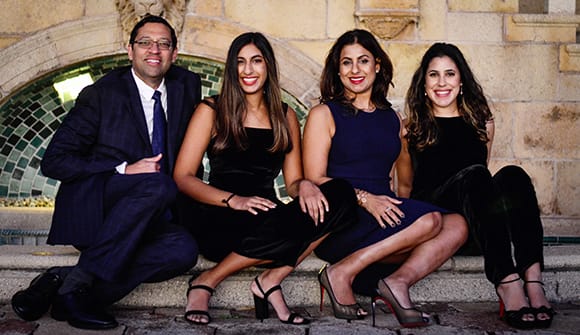'Remembering who I was’
Brain surgeon brings hope with expertise and Portuguese.
Article Author: Wesley Roberts
Article Date:

Charu Raheja, PhD, was gearing up for a fun night out in Miami to celebrate her friend’s 50th birthday. While the evening was filled with joy and excitement for most, the Brazil native and mom of two didn’t feel like herself. The bathroom lighting gave her a pounding headache and she couldn't put on her eye makeup.
She made it to dinner but wasn’t feeling any better. In fact, things got worse. Raheja was sweating profusely, and her headache was worsening. While some friends suggested she go to the ER, she thought it was simply a bad migraine and headed back to her hotel room to sleep.
“When you’re 40 years old, overall healthy and an avid gym-goer, you don’t think anything could be really wrong,” Raheja recalled.
Back in Jacksonville after the trip, things didn’t get better. As CEO of a health care company, she was determined to get through an important meeting, but was confused and barely able to speak. Later in the week, the former competitive swimmer couldn’t even complete one lap in the pool.
When precision counts
Finally, a week after the night out in Miami, Raheja decided to see a doctor. Imaging revealed she had blood on her brain.
To understand exactly what was causing it, doctors recommended an angiogram, a scan showing blood flow through arteries and veins. She was diagnosed with a rare condition called arteriovenous malformation (AVM), which occurs when a group of blood vessels form incorrectly. These blood vessels had burst and bled, causing a hemorrhagic stroke. Additionally, the AVM was in an area of her brain that some doctors told her couldn’t be treated with a minimally invasive procedure. Raheja was sent home to contemplate open-brain surgery.
“I didn’t want to die,” she said. “I just decided I would stay in bed for the rest of my life. If I had open-brain surgery in my left frontal cortex, where my AVM was located, I could lose my ability to walk and talk. The smallest mistake could change my outcome.”
That’s when a friend recommended she meet with Ricardo Hanel, MD, PhD, a neurosurgeon and fellow Brazil native who had recently launched Baptist Health’s Stroke & Cerebrovascular Center as the co-medical director.
“It was important for Charu to stay on blood thinners to reduce the likelihood of future blood clots, so an open procedure wasn’t the best approach. To do an open procedure, she would have to stop blood thinners,” explained Dr. Hanel. “I knew we could approach her case with minimally invasive techniques for the best possible outcome and recovery.”
“I remember Dr. Hanel reassuring me that he would treat his own family members for this and that something had to be done, and that brought me comfort,” said Raheja.
One small movement
Raheja received an AVM embolization to reduce the size and risk of the abnormally connected vessels in her brain. In the catheter-based procedure, doctors inject a coil or substance into the vessels to block blood flow to the area. This helps “reroute” blood flow in the brain to ensure the blood delivers oxygen and other nutrients to the surrounding tissue.
The surgery went well and Raheja was moved to recovery but was unable to move her right side. Her husband stayed by her side all night, encouraging her to move just one finger if she could.
“As I was sitting with her, I refused to believe that my wife would not recover,” said Ravi Raheja. In the middle of the night, she finally moved her right thumb. Elated, her husband called Dr. Hanel to share the news.
“The next day, people kept stopping by my room to talk to me, but I was still very confused. I was unable to answer people’s questions,” said Raheja. “I couldn’t speak.”
Then, Dr. Hanel arrived and greeted Raheja in Portuguese. She returned the greeting.
She could speak in Portuguese and Hindi but unfortunately, her English language was lost.
‘Be yourself’
“At first, I lost my memory completely. I couldn’t remember important things from my girls’ childhood, my favorite colors, what food I liked. I had no concept of who I was,” Raheja recalled. “Then, I went on a meditative retreat and loved dance meditation. I remember a girl holding up a sign that read, ‘Be yourself. Everyone else is already taken.’ That young girl reminded me of myself from years ago. That was the beginning of remembering who I was.”
Raheja had a long recovery but her perseverance, especially to be there for her two girls, kept her motivated throughout the process. She was recently named one of Jacksonville Business Journal’s Women of Influence and her company, TriageLogic, which provides telehealth and remote patient monitoring technology, continues to grow to serve thousands of patients each year.
“My experience as a patient gave me so much compassion for people who I now bring to the technology side of health care,” said Raheja, who is involved in many community organizations.
She added, “I am thankful to the doctors, nurses, family and friends who supported me along my journey. I wake up every morning and remind myself about how fortunate I am to be alive, able to move my body and talk. I take nothing for granted.”
Charu Raheja was one of the first patients treated at Baptist Health’s Stroke & Cerebrovascular Center in 2014. In 2024, the center celebrated thousands of lives changed after a decade of commitment to the community. Raheja shared her story as a reflection of how the experience 10 years ago shaped her life. To learn more about Baptist Health’s Stroke & Cerebrovascular Center, visit baptistjax.com/stroke.



